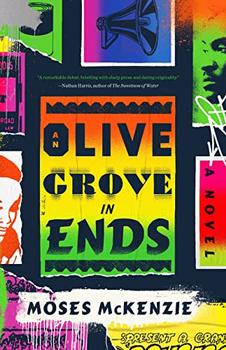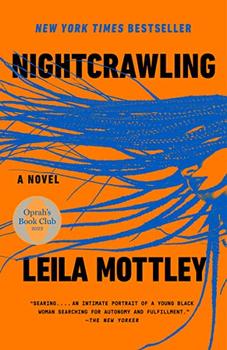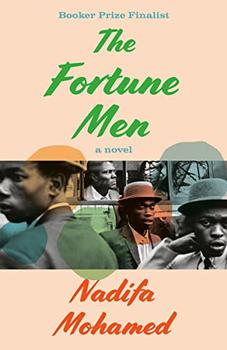Summary | Excerpt | Reading Guide | Reviews | Beyond the book | Read-Alikes | Genres & Themes | Author Bio

Moses McKenzie's debut novel, An Olive Grove in Ends, revolves around Sayon, a young man of Jamaican heritage who lives with his large extended family in a poverty-stricken area of Bristol, England. For as long as he can remember, he's been obsessed with a nearby mansion — the "house-atop-the-hill" — and he fantasizes about the day he'll buy it and move in with the love of his life, Shona. To make the dream a reality he needs money, and he goes about acquiring cash through the only avenue he feels is open to him: selling heroin. His cousins are more than happy to welcome him into the trade, and he starts dealing drugs. When Shona's father witnesses him committing a crime, Sayon is forced to choose between what he sees as his only path forward and the girl he knows he is meant to be with.
McKenzie has created a remarkably sympathetic protagonist in Sayon. As he narrates his story, we quickly realize he's exceptional, born for better things than his circumstances might allow — something his relatives readily acknowledge. While they're content with their lawless lifestyle, by and large, he's seen as the only one in his family who might make it out of a life that "either ends in prison or six feet in the ground." In spite of his many wrongdoings, we root for him to break out of the "family business," win the girl and live a joyous, ideally crime-free life. It speaks volumes about the author's skill that he can make such a deeply flawed character so completely likeable.
There are a number of factors that influence Sayon's choices, all of which the author interweaves seamlessly, creating a complex picture of the challenges a young man born in his socioeconomic strata might face. The idea of a tight-knit extended family is key to the novel. With just a few exceptions, everyone that surrounds Sayon is a relative; they support and shield each other, even when they disagree or disapprove of something. Race and class play significant roles, as Sayon's mostly Black neighborhood becomes subject to gradual gentrification. The financial issues, limited opportunities and easy availability of drugs are major themes, as is the discussion of the role religion can play in one's life — for good or for ill.
Some readers may struggle with the messages this novel sends. There are few repercussions for the lawless behavior exhibited throughout the book. The author poses controversial questions about selling drugs, asking if it's really any worse than alcohol sales, or "chicken shops [that meet] the demands of the obese." Elsewhere Sayon states, "Some of the hardest-working people I knew sold drugs." Life is cheap, with casual murders occurring regularly and mostly without remorse. Christianity takes a beating, too; while in church considering the concept of "God's will," Sayon refers to Jesus as a "puppeteer…deftly moving our strings," and the Christian leaders in his life are shown to be callous hypocrites. Indeed, the author condemns these individuals far more than he does the murderers and drug dealers he depicts. Although I feel a bit uneasy with the author's point of view on these subjects, I love his honesty about them. It adds to the book's authenticity, and in the end, this is more of a plus than a minus.
The narrative sections are beautifully written ("I spent the second half of Year 7 in a wonderful haze. A sepia montage with little dialogue and a soundtrack provided by Earth, Wind and Fire."). However, the dialogue may be difficult to decipher for readers not familiar with Jamaican, Somalian and British slang (e.g., "Who im deh wid?" "Mi av ahh bone fi pick wid im, enuh"). Sometimes the context clarifies what the characters are discussing, but more often than not there's no indication, and sometimes following these conversations is integral to understanding the plot. I found that somewhere around the midpoint of the book I'd adjusted, but it was a fairly large hurdle to overcome at first. Struggling with these passages interrupted the book's flow and slowed the overall reading experience.
Although the above-mentioned concerns may be a barrier for some, I did really enjoy An Olive Grove in Ends. I found it to be wholly original, and Sayon a unique and fascinating narrator. The fact that it's McKenzie's first novel makes it all the more exceptional. If one of the reasons a person reads is to explore different cultures and see society from a different point of view, then this book definitely hits the mark. I recommend it for adult audiences looking for an unusual but well-crafted novel, as well as book groups who are willing to undertake the challenges the novel presents.
![]() This review was originally published in The BookBrowse Review in June 2022, and has been updated for the
August 2023 edition.
Click here to go to this issue.
This review was originally published in The BookBrowse Review in June 2022, and has been updated for the
August 2023 edition.
Click here to go to this issue.

If you liked An Olive Grove in Ends, try these:

by Leila Mottley
Published 2023
A dazzling novel about a young black woman who walks the streets of Oakland and stumbles headlong into the failure of its justice system - the debut of a blazingly original voice that "bursts at the seams of every page and swallows you whole" (Tommy Orange, bestselling author of There There).

by Nadifa Mohamed
Published 2022
Based on a true event, an intimate and harrowing novel about the last man in Cardiff to be sentenced to death.
Your guide toexceptional books
BookBrowse seeks out and recommends the best in contemporary fiction and nonfiction—books that not only engage and entertain but also deepen our understanding of ourselves and the world around us.